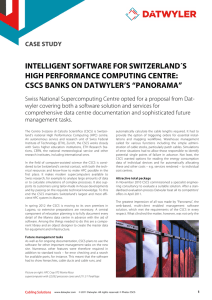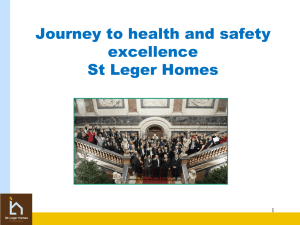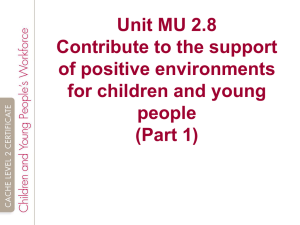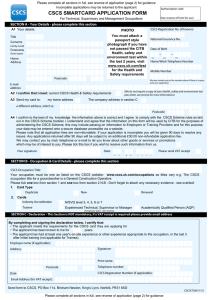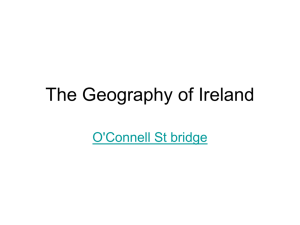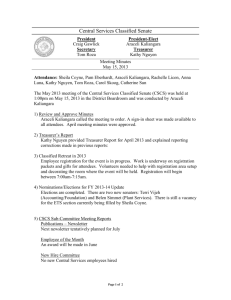Multi–Agency Initiatives
advertisement
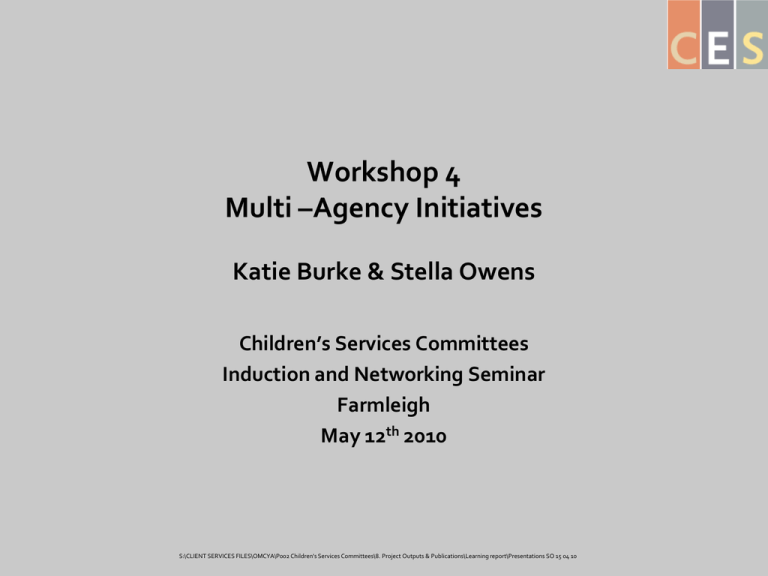
Workshop 4 Multi –Agency Initiatives Katie Burke & Stella Owens Children’s Services Committees Induction and Networking Seminar Farmleigh May 12th 2010 S:\CLIENT SERVICES FILES\OMCYA\P002 Children's Services Committees\8. Project Outputs & Publications\Learning report\Presentations SO 15 04 10 Objectives of the Workshop The objectives of the workshop are to enable participants to: Begin to have a better knowledge and understanding of the range of multiagency initiatives in use in the CSCs Gain better awareness of ‘who is doing what and where’ Have an understanding of the challenges associated with the planning and implementation of multi – agency initiatives in CSCs 2 © Centre for Effective Services 2010 Introduction CES work to support the development of Children’s Services Committees: o ‘Learning from experience to support the future – Findings emerging from the initial phase of the Children’s Services Committees’ (April 2010) o ‘Key Terms relevant to the Children’s Service Committee Initiative’ (May 2010) o Research study, funded by the OMCYA, aimed at: o a) Describing the current multi-agency initiatives and models being used in the CSCs, identifying evidence of best practice and core principles underpinning these initiatives o b) Analysing the implications of these for the CSCs, exploring their potential to be standardised within a national framework for implementation (December 2010) 3 © Centre for Effective Services 2010 Key Terms relevant to the Children’s Service Committee Initiative Objective of the document o Brief document providing some explanation and definition of differing terms and conceptual frameworks relating to multi-agency initiatives currently in use in the CSCs o Preliminary document which will be added to as the CES and CSC work progresses o Audience - CSC stakeholders which include: o o o o o o o o HSE Local authority Education Probation Youth Justice Gardaí Community and voluntary groups NCSIG members 4 © Centre for Effective Services 2010 Key Terms relevant to the Children’s Service Committee Initiative Interagency collaboration – Section 1 Working together o Interagency working o Multi-agency working o Joined-up working o Integrated working – integrated processes Policy Frameworks relevant to working together – Section 2 o Ireland - National Children’s Strategy (2000) Agenda for Children’s Services (2007) o England & Wales – Every Child Matters (2004) o Scotland – Getting it Right for Every Child (2005) o Northern Ireland – Our Children and Young people – Our Pledge (2006) 5 © Centre for Effective Services 2010 Key Terms relevant to the Children’s Service Committee Initiative The outcomes for Ireland and the UK map onto one another, demonstrating the close degree of similarity across the different schema Republic of Ireland The Agenda for Children’s Strategy 2007 www.omc.gov.ie Northern Ireland Our Children - Our Pledge 2006 www.allchildrenni.gov.uk Scotland Getting it Right for Every Child 2005 www.scotland.gov.uk England and Wales Every Child Matters www.everychildmatters.gov. uk Healthy, both physically and mentally Healthy Healthy Be healthy Supported in active learning Enjoying, learning and achieving Achieving and Active Enjoy and achieve Safe from accidental and intentional harm Living in safety and with stability Safe Stay safe Economically Secure Experiencing economic and environmental wellbeing Nurtured Achieve economic well-being Part of positive networks of family, friends, neighbours and the community Contributing positively to community and society Responsible Make a positive contribution Included and participating in society Living in a society which respects their rights Included and respected Secure in the immediate and wider physical environment Key Terms relevant to the Children’s Service Committee Initiative Models of child and family development relevant to working together – Section 3 o Ecological Model o This model provides a framework for understanding the mutual influences that the child, family, community and wider society have upon one another. o Theoretically underpins assessment frameworks below o Hardiker Model Assessment frameworks relevant to working together – Section 4 o Framework for the Assessment of Children in Need (UK) o Common Assessment Framework (England & Wales) o My World Triangle (Scotland) o Framework for the Assessment of Vulnerable Children and their Families (CRC TCD) o ION & LANS © Centre for Effective Services 2010 7 Key Terms relevant to the Children’s Service Committee Initiative Hardiker Model Level of intervention Level 4 Intensive and Longterm Support and Protection for Children and Families Level 3 Therapeutic and Support Services for Children and Families with Severe Difficulties Level 2 Support and Therapeutic Intervention for Children and Families in Need Level 1 Universal Preventative and Social Development Services Population size © Centre for Effective Services 2010 Key Terms relevant to the Children’s Service Committee Initiative The Assessment Triangle © Centre for Effective Services 2010 Key Terms relevant to the Children’s Service Committee Initiative Specific Interventions/initiatives for interagency working – Section 5 o Differential Response Model/Alternative Response Model o Restorative Justice Data sharing protocols/systems for interagency working – Section 6 o Data sharing protocols Technical and other terms – Section 7 o Outcomes o Indicators o Evaluation o Participation 10 © Centre for Effective Services 2010 Exercise in Groups Break into 3/4 groups Discuss in your groups the four questions listed on slide 12 Use the flip charts provided for feedback purposes – one flip chart per question 45 minutes to complete the exercise Flip charts will be collected and findings fed back to wider group 11 © Centre for Effective Services 2010 Questions for Groups What is your experience of using any of these models/initiatives? Why and how was the model/initiative chosen? What stage are you at in terms of its implementation? What challenges has or is the implementation process presenting? 12 © Centre for Effective Services 2010


